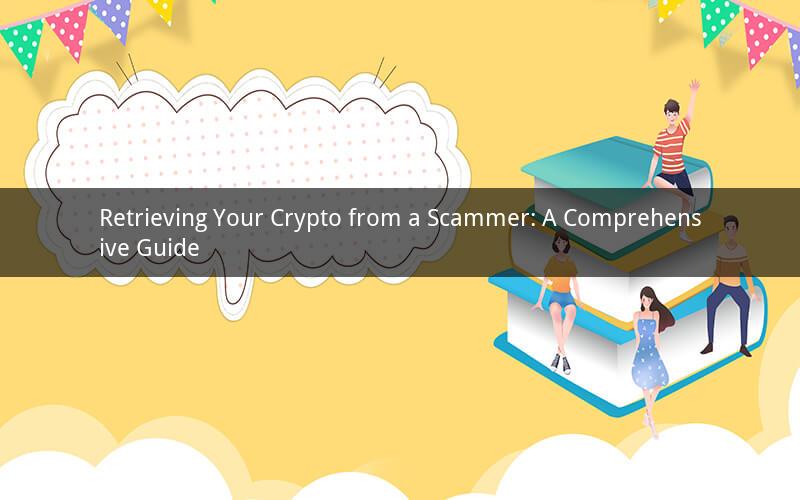
Introduction:
Losing your cryptocurrency to a scammer can be a devastating experience. However, there are steps you can take to try and recover your assets. This guide will provide you with valuable information on how to get your crypto back from a scammer.
1. Report the Scammer:
The first step in retrieving your crypto is to report the scammer to the relevant authorities. This will help in taking legal action against them and prevent them from targeting other victims. Here's how you can report a scammer:
- Contact the cryptocurrency exchange where the scam occurred and provide them with all the necessary details.
- Report the scammer to the police or cybercrime unit in your country.
- Inform the cryptocurrency community about the scammer to prevent others from falling victim to the same scheme.
2. Analyze the Scam:
Understanding how the scammer obtained your crypto is crucial in determining the best course of action. Here are some common types of scams and how they work:
- Phishing: Scammers send fraudulent emails or messages that appear to be from a legitimate cryptocurrency exchange or wallet provider. They trick you into providing your private keys or login credentials.
- Ponzi schemes: Scammers promise high returns on investment, but they use the funds from new investors to pay off earlier investors, eventually collapsing and absconding with the money.
- Fake exchanges: Scammers create fake cryptocurrency exchanges that mimic legitimate platforms. They trick you into depositing your crypto, only to disappear with the funds.
- Social engineering: Scammers manipulate individuals into revealing their private keys or other sensitive information through psychological tactics.
3. Contact the Scammer (if possible):
In some cases, you may be able to contact the scammer directly. This can be done through email, social media, or other communication channels. Here's what to do if you manage to reach the scammer:
- Demand the return of your crypto: Politely explain the situation and request the return of your assets.
- Provide evidence of the scam: Share screenshots, transaction records, or any other proof that supports your claim.
- Be cautious: Remember that scammers may try to manipulate you further or demand a ransom. Do not comply with any suspicious requests.
4. Utilize Blockchain Tracing Tools:
Blockchain tracing tools can help you track the movement of your stolen crypto. These tools can provide valuable information about the wallet addresses involved in the transaction. Here are some popular blockchain tracing tools:
- Etherscan (for Ethereum)
- Blockchain.com (for Bitcoin and other cryptocurrencies)
- CoinTracking (for multiple cryptocurrencies)
- Blockchair (for Bitcoin and other cryptocurrencies)
5. Engage with the Community:
Joining cryptocurrency forums and communities can provide you with support and guidance during this challenging time. Here's how you can engage with the community:
- Share your story: Explain what happened and seek advice from experienced members.
- Offer to help others: Share your knowledge and experiences to help others avoid falling victim to scams.
- Support legal action: If possible, provide evidence or assistance to law enforcement agencies or legal teams pursuing the scammer.
6. Consider Legal Action:
In some cases, legal action may be necessary to recover your stolen crypto. Here's what you can do:
- Consult with a lawyer specializing in cryptocurrency law: They can provide you with guidance on the best course of action.
- File a lawsuit against the scammer: If the scammer is identified and located, you can file a lawsuit to recover your assets.
- Report the scammer to international authorities: If the scammer is based in another country, you may need to involve international law enforcement agencies.
7. Prevent Future Scams:
To avoid falling victim to scams in the future, follow these tips:
- Educate yourself: Learn about common scams and how to identify them.
- Use secure wallets: Store your cryptocurrency in a secure wallet and keep your private keys safe.
- Be cautious of unsolicited offers: Never invest in cryptocurrency without conducting thorough research.
- Stay informed: Keep up-to-date with the latest news and developments in the cryptocurrency industry.
Frequently Asked Questions:
1. Q: Can I recover my crypto if the scammer has already disappeared?
A: It's challenging to recover your crypto if the scammer has already disappeared, but you can still report the scam to authorities and engage with the cryptocurrency community to prevent others from falling victim to the same scheme.
2. Q: What if the scammer demands a ransom to return my crypto?
A: Never comply with a ransom demand from a scammer. Instead, report the scam to authorities and seek legal advice on how to proceed.
3. Q: Can I recover my crypto if the scammer is located in another country?
A: Recovering your crypto from a scammer in another country can be difficult, but it's not impossible. Engage with international law enforcement agencies and legal teams to pursue the scammer.
4. Q: How can I prevent future scams?
A: Educate yourself about common scams, use secure wallets, be cautious of unsolicited offers, and stay informed about the latest developments in the cryptocurrency industry.
5. Q: What should I do if I suspect I've been scammed?
A: If you suspect you've been scammed, report the scam to the relevant authorities, contact the cryptocurrency exchange or wallet provider, and engage with the cryptocurrency community for support and guidance.